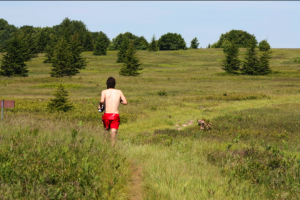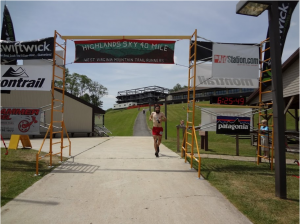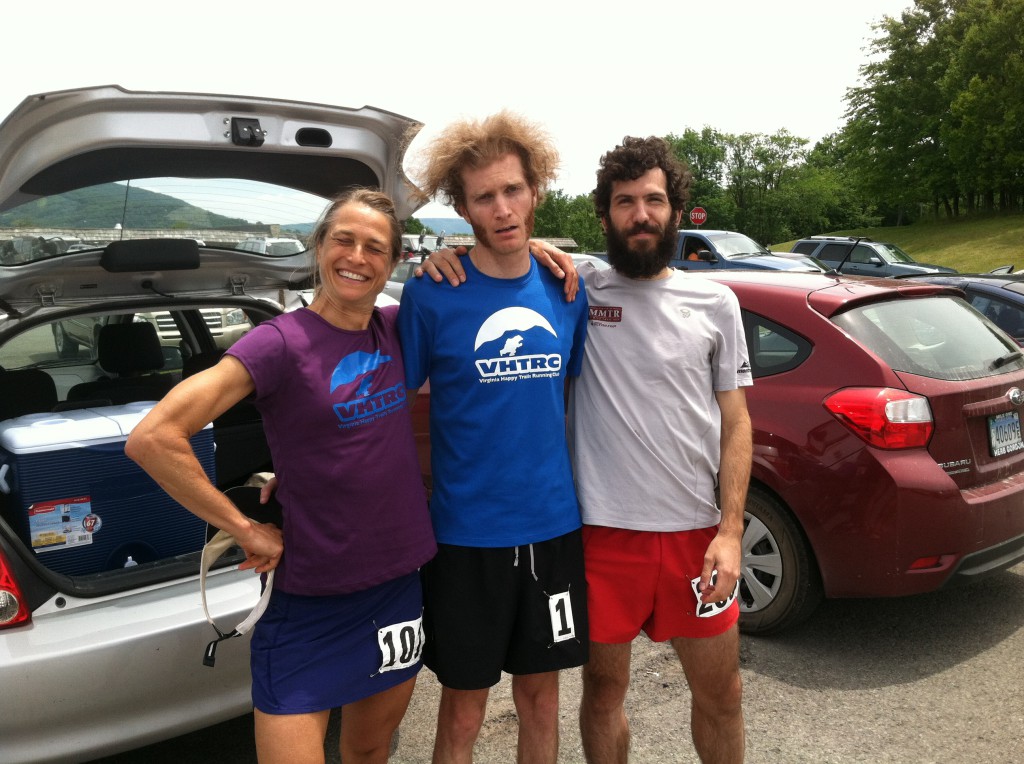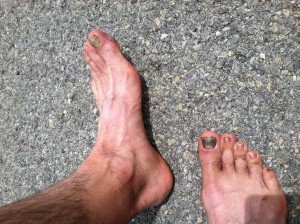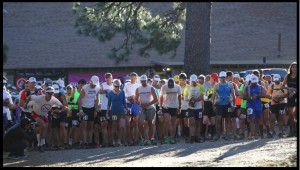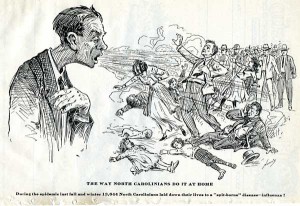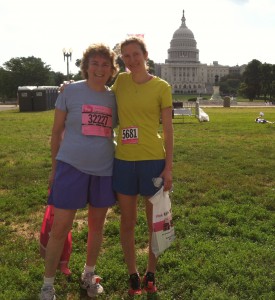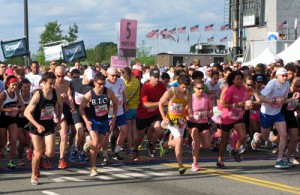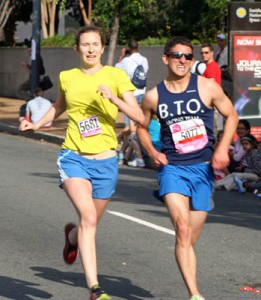Brian Greeley
Highland Sky 40
June 16, 2012
I tried to get Brian to let us videotape him rapping this in the sweater vest he won so we could post that, but he respectfully declined:
Here’s a little story I got to tell
About a bearded man you may know so well
June 16th is when this race went down
A forty miler in a West Virginia town
The race begins nice and early
The weather is cool and my hair is curly
Down a gravel road we all trot
Running from the starting point: a scenic parking lot
A sharp left turn puts the runners in grass
Past the first aid station, get some water for your butt
We gradually climb, going up and up
Through the muddy patches and thistles clumps
As a group of five, we reach the top
The pace is comfortable but then there’s a stop
All of the sudden Aaron loses his shoe
A common casualty to the muddy glue
Now here’s the thing about these long trail races
A lot of things happen, but I forget the traces
I’m going to fast-forward near mile twenty
It’s the aid station and the road is long and plenty
Hard packed gravel comprises this road
Surely not an ideal transportation mode
Ahead, fellow runners tackle mounds oh so high
They curse the beautiful section, ‘The road across the sky’
Back on the trail things feel surprisingly good
This unique section of the sods has no overhanging wood
From rock to rock on tired legs I hop
My water is gone, now I beg to stop
The last true trail section eagerly awaits
And with Martha in tow the pain finally abates
On we run past bikers and horses
Down gnarly steep hills and up sheer ski courses
It felt like time stood still as we ran on the road
Frankly it was terrible but I bore the load
Many expletives did make their way out
Save at aid stations where someone might have clout
Onward to the finish did we push
At this juncture my legs were simply mush
But alas there it is, the finish line ahead
It’s over, and to my surprise I didn’t drop dead
A lot of things must happen behind the scenes
To make a race go smoothly and keep everything clean
I must thank the volunteers, Martha, Aaron, Dan, & Kerry
Without everyone’s help this race would be quite hairy,
So thank you all, indeed it was a lovely trot!
Next year when I’m in Michigan, I’ll sure miss you a lot.
June 16, 2012
Davis, WV
Pretty much everything you need to know about Highland Sky is written in this picture: Ragan rocked it, setting a new CR in 7:03; Aaron pulled out a remarkable 11th place having run less mileage this spring than he typically covers in the first two weeks of January, but undeniably suffered for it; and Brian snagged the last top-5 spot in his HS rookie debut. I paced Brian from mile 32 (finishing the course from where I dropped out last year), and then swung around again to run the last mile or so with Aaron. The last 4 miles of HS are on some long, lonely, sun-exposed roads, and I was happy to be able to cheer up that otherwise miserable section of the race. As Aaron and I were running, Aaron mentioned that he’d been running earlier in the race with a guy who recounted a story about last year at HS how there was an escape horse on the trail early in the climb and how a girl had asked him if it was his pony. Aaron admitted that yes, he knew that girl. I later reunited with the guy at the finish line and admitted that I was the pony line girl. Anyway, I’ll leave these champions to tell their own stories. Aaron has promised us a perfect sonnet.
Tuesday was my first WUS back in a long time — being injured is so isolating and lonely — and after my recent work travails a good dose of WUS was exactly what the doctor ordered.
WUSsies were popping up like daisies after a spring rain: we had Justine post-baby, and Ryon post-concussion and face-splitting (25 stitches, was it?), and Vishal post-shoulder dislocating Glover Park steps tumble; we had Sophie from Charlottesville and a new guy from Colorado — we nearly expected Amy to swoop in from Portland; Sabrina is back for a couple summer months; Tracy made a rare appearance with Keith; and I don’t even have space to list the whole boatload of WUS regulars that showed. Good luck to the other CPBGers trying to catch the NBA finals on the television — the roof deck was ours.
So good to catch up on all the crazy WUSsie news. We got weddings galore and babies born and getting ready for their world debut (Neal & Gaby’s boy is gunning for October). And what’s this with BOBBY GILL getting hitched? Wasn’t it was just a year ago he was drooling over my Italianos? Maybe we’ll have to have a Beer Mile just to lure him out to confirm the rumors.
WUSsies been tearing it up. This is the best picture I’ve seen in a while. You just gotta love Joe Clapper.
On this blog I’ve made numerous indirect references to my job (e.g., postings my work trips to China, Istanbul, and Kathmandu; NIH 5k runs; and of course the famous colleagues from Italy, Alice & Isabella). But I haven’t written much about what I actually do for my job, mainly because it never related much to running except for taking me to cool new places to run. But this this weekend was different, on Saturday my work and running worlds fully collided. I was entirely planning to run a 4-mile PR Twilight Race in Ashburn at 7:30pm on Saturday night. But work was making me, as my Jewish mom would say, meshugana (meshugana is yiddish for crazy person; my mom tends to use it more to mean a temporary crazy spell). And to explain why I’d gone meshugana I have to relate a little about what I actually do for a living besides constantly travel to exotic countries.
Most people know that I’m a biologist who studies viruses at the NIH. Some can elaborate that I don’t do ‘wet lab’ (ie anything that involves a pipet or rubber gloves) but do computer analysis of the genetic sequences of rapidly evolving RNA viruses like influenza. Those who get extra big cookies can say that studying the evolution of influenza viruses is important for several reasons: (a) the virus evolves so quickly that the influenza vaccine must be updated annually with new strains, and predicting new strains remains a major public health challenge, and (b) there is a lot about the seasonality and spatial spread of influenza that we still don’t understand, and you can use genetic data to study spatial and epidemiological patterns in very fine detail. Since the 2009 swine-origin influenza pandemic, I’ve been studying influenza increasingly in pigs.
I love so many aspects of my job — I have a lot of freedom to follow my curiosity and pick my own projects, and to work in various locations — home, West Virginia, with my PhD adviser at Penn State, or in my lovely little office in an old mansion on the NIH campus, I have really wonderful colleagues (Alice and Isabella as cases in point), and I get to travel to very cool places to collaborate on work projects. But there is one part of my job that drives me nutty, hair-pulling nutty, and that is Bayesian analysis.
The crux of my work involving inferring phylogenetic trees from hundreds of viral sequences to visualize the evolutionary history of the viruses and how viruses collected at different times and in difference geographical places are related. [For the very, very few of you interested in more detail, a nice review of the applications of evolutionary analysis of influenza to uncover basic viral characteristics like seasonality, spatial spread, and drug resistance is available: nelson-holmes-evolution-epidemic-influenza-NRG-07]. Phylogenetic trees (such as the classic one showing the genetic relatedness of humans, chimps, gorillas, and other apes) are central to the concept of evolution and even Darwin sketched a loose vision of a phylogenetic tree in his notebooks to explain the notion of common ancestry among organisms.

Darwin's tree, sketched in his notebook under the words 'I think' has become a popular tattoo. I wonder if this girl can help me with my Bayesian phylogenetic analyses.
There are many different computational methods for inferring a phylogenetic tree, with the general trade-off being that slower, more computationally intensive methods generally more accurate trees, while quick-and-dirty methods are faster but make more assumptions. Currently in vogue are Bayesian trees that incorporate prior assumptions (based on empirical evidence) and that produce not a single tree but an entire distribution of trees (generally 10,000 or so) with different probabilities of being the ‘real’ tree. The Markov chain Monte Carlo (MCMC) algorithm is a nifty, commonly used algorithm that searches through ‘tree space’ to assess the probability of different trees. There are various convergence statistics that determine whether the chain has been run long enough (anywhere from 5 million – 100 million or more iterations) to reach convergence. You can endlessly fiddle with various parameters of your model to try to improve the rate of convergence, you can use different sized data sets, you can practice all kinds of black wizardry, or you can act like a toddler and mope, cry, tantrum, despair, and refuse to run 4-mile races. I generally opt for the latter.
I am not a technically savvy person. If Aaron adjusts all the settings on the camera, I’ll point and click it. I never even bought a home printer because I was convinced I would never get it to work. You all know I don’t use GPS or heart monitors or even watches. I’m a shameless luddite. So how did someone as technically Stone Age as I end up in a job that primarily involves extremely complicated computational analysis? I ask myself that on a regular basis. What was I thinking?? Why didn’t I choose something I was marginally competent at for a career? The problem is that I’m obsessed with the fascinating underlying scientific questions. Viral evolution is remarkable — the different strategies viruses have for successfully transmitting, infecting, and replicating in various different species of host. The speed at which viruses adapt to different selective pressures, and the constraints on evolution and trade-offs. These miniscule packets of genetic information (influenza virus has a ~12kbp genome encoding for 11 genes, while the average genome of tiny bacteria is ~5,000 Kbp) that are able to thrive in so many species. Rabies is the most amazing — the way the virus actually induces dramatic neurological changes in the host (rampages of biting) to perpetuate the virus’s own transmission. And now modern sequencing technology continues to advance each year allows for unprecedented study of how these tiny genomes evolve, and how the evolution is being driven by changes in ecology, agricultural practices, and human demography and behavior. And not only does understanding the evolutionary dynamics of viruses have major implications for human health, but also reveals basic evolutionary processes of natural selection and random genetic drift that are far easier to study at these restricted scales than in humans or even bacteria and is our best weapon against the anti-evolution radical Christian factions.
I think I would be able to tolerate being bad at a job that I love conceptually while being technically incompetent (or sub-par, whatever) if I weren’t….well, me. I’ve always had a hard time swallowing the feeling of disappointing others — something I thought I would shed over time, like one of those teenage pimples you thought you were done with at 16 but that still erupts at 30. It manifests in running, too. I’m still stupidly sensitive to the sinking feeling of being a disappointment. I don’t understand how I can still feel the same way I did at age 30 as I did as a child, hanging my head after a soccer game lost. When do we get over these things? And when do we stop going for our own jugulars at the slightest whiff of failure? It’s funny, when I race my little silent self pep talk is one simple request to my head to just please stay out of the way, to just be quiet, to not fire its fusillade of negative thoughts that I’ll have to spend a good part of the race just trying to stamp out. Well, we’ll save a detailed discussion of what my brain tries to do to me while racing for another day — there’s a lot of backstory there. Heck, I think Brian Greeley could fill a neuroscience thesis on the places my head goes when the gun goes off.
Susan Komen Race for the Cure 5k
Wahington, DC
June 2, 2012
In comparison, the Susan G. Komen Global Race for the Cure makes the Washington Metro system look like a Prussian military drill team in terms of organizational efficiency. As with past years, this year’s race did not start on time, had dramatic deficiencies in port-o-potty availability, had a chaotic start line, no mile markers, and no finishers awards. This year we had some extra adventures like no one directing the traffic that was crossing Constitution Avenue during the race (I’m convinced that my bright yellow shirt was all that spared me from the fast-moving cars). But there is no race I’ve been as devoted to — I’ve run the Race for the Cure nearly every year since high school to celebrate another year of my mom’s winning battle against breast cancer.
Most years there is some kind of debacle. Last year I was still in the portojohn when the race went off. No one forgets the sweltering year when they made us stand on the line for 20 minutes extra while various foreign dignitaries waxed on. Then there was the year I peed in desperation behind the garden behind the fountain of the National Archives. And the year my mom spent an hour trying to find out from someone with any knowledge of the event when I would get my 2nd place overall medal (we finally got a response that No, medals are only for the people that win). The race is much more about fundraising than about running — although this year participation was down by around 40% from last year because of the flap over the organization’s February decision to stop funding Planned Parenthood because of a congressional investigation into whether the group was using federal money to pay for abortions (Komen reversed course after overwhelming public reaction but clearly the image of the organization remains tarnished).
I told Aaron that this year I was going to dehydrate myself so that I didn’t have to deal with the annual pee problem. But even so I had to pee desperately. I decided to hold it. My plan was that if it came to it, I could always splash a cup of water down the front of my shorts. Yes, I have a proven ability to pee while running, as I discovered during my Escarpment Trail run. I don’t care if I can’t run 100 miles or even a 50k without puking; pissing myself while in full stride makes me a real trail runner in my mind.
While the first ten feet of the starting line was purportedly reserved for people who were planning to run 5:00min miles, today it was crammed with 10min milers. It took me 6 seconds even to get to the starting line because I was so boxed in. But I dashed out to an outside lane where wasn’t getting bounced off boobies anymore, and started ticking off the rest of the female field wearing the logos of familiar DC running stores. I snatched the lead by the first mile and finished in 17:59 (17:53 chip time), 8th overall. Honestly, I think I ran so fast because I had to pee so damn bad. I nearly held it, but the finish line sprint against a guy who’d been sitting on my ass the last mile was too much for my poor little bursting bladder, which released a dribble of its contents during that last burst of effort. But he was a dick, brazenly drafting off me and then trying to sprint ahead of me at the end. I guess those are the choices we have to make in life: either put the drafter dude back where he belongs or keep your shorts dry.
The real victory was not finishing first female, breaking 18 minutes, or holding off drafter dude in our long sprint to the finish — the real victory was finding a pristine portopotty after the finish line, where my bladder sighed with relief. That’s the best 5k time I’ve run in a while, and I was full of beans. I attribute it to the very low mileage I’ve been doing (as I’ll tell anyone who’s trying to run faster, it’s tough to pile on the mileage and ask your legs for speed at the same time). I’ve been injured since the Boston Marathon, with a nagging IT band injury that’s kept me from WUSsing, running Promise Land, and even from my Wednesday Brian-Sean runs. Dark times, it’s been. With this kind of IT band injury, I can run hard and fast, but as soon as my pace slackens the pain returns. Recently I’ve been able to run more comfortably, but for a while I had to run as if with a gun to my head.
My mom, the true champion of the day, cruised in under 43 minutes, finishing 9th in her age group. We knew better than to linger around for an awards ceremony. So my mom grabbed her Survivor goodie bag (she was one of 171 Survivors who ran) and we beelined it to celebrate at Open City with a monster brunch.
Archives
- ► 2024 (6)
- ► 2023 (3)
- ► 2022 (3)
- ► 2021 (9)
- ► 2019 (13)
- ► 2018 (7)
- ► 2017 (16)
- ► 2016 (27)
- ► 2015 (27)
- ► 2014 (29)
- ► 2013 (26)
- ► 2012 (42)
- ► December (9)
- 2013: another year, another chance to try to not f&*k everything up
- A White Canaan Christmas
- A very merry fat ass
- The Long-Awaited Weinberger WUS
- Survey Response
- Team Floo Fighters Jingle All the Way
- Neil Young versus the Silver Diner juke box
- Um, ignore last posting - guy is CREEPY
- Looking for Lost Love on Shady Grove Road
- ► November (3)
- ► October (6)
- ► September (7)
- ► August (1)
- ► July (3)
- ► June (5)
- ► April (4)
- ► March (2)
- ► February (2)
- ► December (9)
- ► 2011 (69)
- ► December (2)
- ► November (5)
- ► October (4)
- ► September (5)
- ► August (7)
- ► July (4)
- ► June (7)
- ► May (15)
- Luna's Beer Mile
- Happy birthday, Mario!
- Kerry's Death March - May 21, 2011
- A moment in time. The first WUS run.
- Kerry's Death March
- Choose Your Own Adventure
- The Bear
- Come hither. Drinketh from the WUS cup.
- Neal's take
- When did it happen?
- When will it happen?
- NIH Take a Hike Day
- If it ain't on video, it didn't happen
- The REALLY big question
- Beer Mile: Post-Race Coverage
- ► April (16)
- Layers
- Thoughts of a beer-miler
- Beer Mile Haiku
- Beer Mile: Post-Race Coverage Preview In Which Sean B Expresses The Consensus Emotion On The Topic Of Beer Miles
- Beer Mile
- Beer Mile: Pre-Race Coverage
- Beer Mile Logistics
- Sean Thumb
- Donut Run
- Frisco Ultra Contingent
- Logistical Information for Inaugural WUS Donut/Beer Run Series
- WUS shirt
- Charlottesville Marathon
- Bull Run: A 50 Mile Sonnet
- Trail Maintenance in Rock Creek Park
- ► March (4)
Recent Comments
- Kerry Owens on Hellgate 100km++ 2024
- Seb on WUS Awards 2024
- Jaret on WUS Awards 2024
- Kirstin on Richmond Marathon: Not Dead Yet
- Mario on Richmond Marathon: Not Dead Yet
